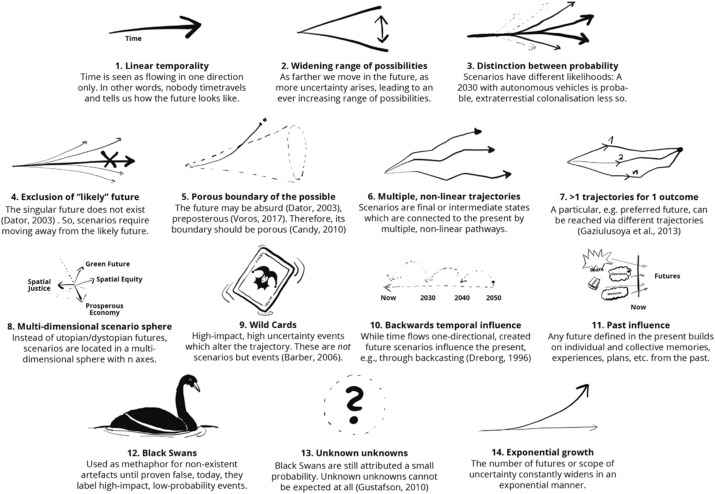Navigating the Future: The Forces Shaping Our World

At its core, the ability to change and evolve is fundamental to survival. Whether a species adapts to a new environment or a company pivots in response to market shifts, adaptability is key. Change and evolution are not merely aspects of our world; they are its driving forces. They compel us to adapt, innovate, and grow, both collectively and individually. Understanding and embracing these forces is crucial for navigating the future, whether in business, society, or personal life.
The Power of Megatrends
Megatrends are the massive, transformative forces that will define the future. These are not mere trends that come and go; they are the undercurrents of change that have a profound and lasting impact on the world, shaping it for years to come. Technological advancements, demographic shifts, and climate change are among the most significant megatrends that we must not only understand but also plan and adapt for in the long term.
A few impactful megatrends already shaping our future are climate change, demographic change and technological innovation.
Climate change is perhaps the most urgent megatrend, with rising global temperatures, sea-level rise, and more frequent extreme weather events posing significant risks to ecosystems, economies, and human health. The transition to renewable energy sources and sustainable practices will be essential to mitigate these effects and promote environmental sustainability.
Demographic changes will play a critical role in shaping our future. An aging population in developed countries will increase the demand for healthcare services and pension systems, while youthful demographics in developing regions will drive economic growth and urbanization. Cities will continue to expand, requiring innovative infrastructure solutions to ensure sustainable and inclusive development.
Technological innovation, particularly in artificial intelligence and automation, is set to revolutionize industries and redefine the nature of work. As machines take over routine tasks, humans must adapt by developing new skills and focusing on more complex and creative roles. This shift will not only alter job markets but also raise important ethical questions about privacy, bias, and the societal impact of widespread automation.
The Unpredictability of Black Swans
While megatrends provide a broad overview of future developments, the future is also shaped by unpredictable and rare events known as black swans. Coined by Nassim Nicholas Taleb, black swan events are rare and unpredictable occurrences with profound and far-reaching impacts. These events can alter the course of history, reshape societies, and redefine our understanding of the world. They range from financial crashes and pandemics to natural disasters and geopolitical upheavals.
Even though not everyone shares the same view, here are three notable events that may be coined black swans. They have, in different ways, significantly shaped our world and future:
1. The 2008 Global Financial Crisis
The 2008 financial crisis is a quintessential black swan event that triggered a global economic downturn. Originating from the collapse of the housing bubble in the United States, the crisis rapidly spread through the interconnected global financial system. The aftermath saw the failure of major financial institutions, severe market crashes, and widespread economic hardship. Governments and central banks worldwide had to implement unprecedented bailouts and monetary policies to stabilize economies. The crisis led to significant regulatory reforms. It also reshaped economic policies and brought attention to the risks of complex financial instruments and inadequate oversight.
2. The September 11, 2001 Terrorist Attacks
The terrorist attacks on September 11, 2001, were a shocking black swan event that had immediate and long-lasting impacts on global politics, security, and society. The attacks led to the deaths of nearly 3,000 people and precipitated the War on Terror. In response, the US and its allies launched military interventions in Afghanistan and Iraq, which have had profound geopolitical implications. Airport security, surveillance, and counterterrorism measures were drastically increased, affecting everyday life and international relations.
3. The COVID-19 Pandemic
The COVID-19 pandemic, which began in late 2019, is one of the most impactful black swan events of recent times. The virus spread rapidly across the globe, leading to widespread illness, death, and economic disruption. Governments imposed lockdowns, travel restrictions, and social distancing measures to contain the virus, profoundly affecting daily life and economic activities. The pandemic highlighted vulnerabilities in global health systems and supply chains, prompting a reevaluation of public health preparedness and resilience. It also accelerated trends such as remote work, digital transformation, and the development of mRNA vaccine technology, which could have lasting impacts on healthcare and workplace practices.
The COVID-19 pandemic is a stark reminder of how a black swan event can disrupt societies and economies globally. Such events challenge our preparedness and resilience, highlighting the need for robust risk management and adaptive strategies. The unpredictability of black swans means that organizations and governments must develop flexible plans to respond to sudden changes and crises.
Preparing for the Future
In addition to megatrends and black swans, the future is influenced by other forces, from tipping points and chaos theory to day-to-day decision-making.
Malcolm Gladwell describes a tipping point as the critical moment when an idea, trend, or social behavior crosses a threshold and spreads rapidly. Understanding tipping points can help us anticipate and manage sudden social and economic dynamic shifts.
Even our daily decisions, though seemingly small and insignificant, collectively shape the future. Every choice— personal, professional, or societal—creates ripples that can lead to significant long-term impacts.
Scenarios planning
Scenario planning is as a powerful tool for navigating the future. It allows individuals, organizations, and societies to anticipate potential futures and prepare strategically for a range of possibilities - from possible and plausible futures to desirable and undesirable futures.
Scenario planning involves creating and analyzing multiple plausible futures based on varying assumptions about key drivers and uncertainties. Unlike traditional forecasting, which often relies on linear projections of current trends, scenario planning considers a wide range of variables and their potential interactions. This approach acknowledges that the future is not predetermined and that multiple outcomes are possible.
By exploring different scenarios, we can better understand the complexities of the world, identify risks and opportunities, and make more informed decisions.
The futures cone, which has been around since the 1990s, helps explain the concept.

Visual aids
The futures cone is one of the most common artefacts to visualise concepts of futures studies. What other tools can be utilized?
In their report "How to visualise futures studies concepts: Revision of the futures cone" (2022) Gall et al provides a renewed look at the futures cone, and describes a few options to help us on the journey.

Image: Visual tools for futurists, from "How to visualise futures studies concepts: Revision of the futures cone", by Gall et al (2022).
Your next step?
There are numerous resources available to help you learn more about these concepts. Books like "The Black Swan" by Nassim Nicholas Taleb and "The Tipping Point" by Malcolm Gladwell provide foundational knowledge on black swans and tipping points. Donella H. Meadows' "Thinking in Systems" offers a primer on systems thinking and complexity. Academic journals, online courses, and research institutions also provide valuable insights and research on future studies, scenario planning, and complexity theory.
You can also contact us to help you on the way.
